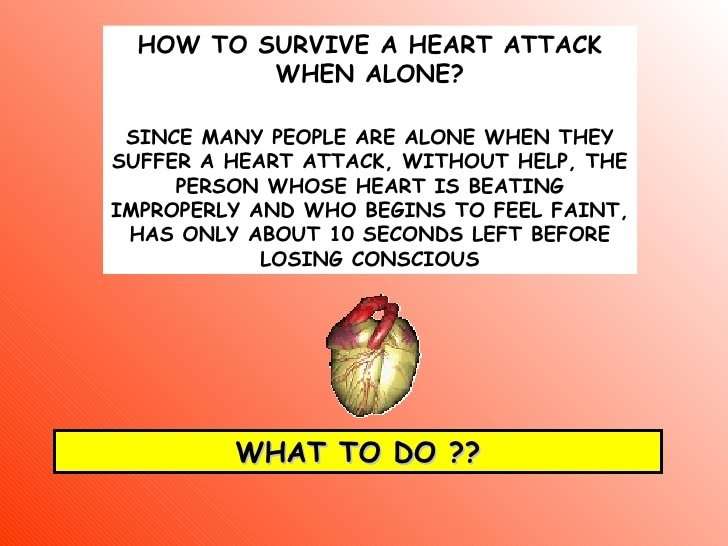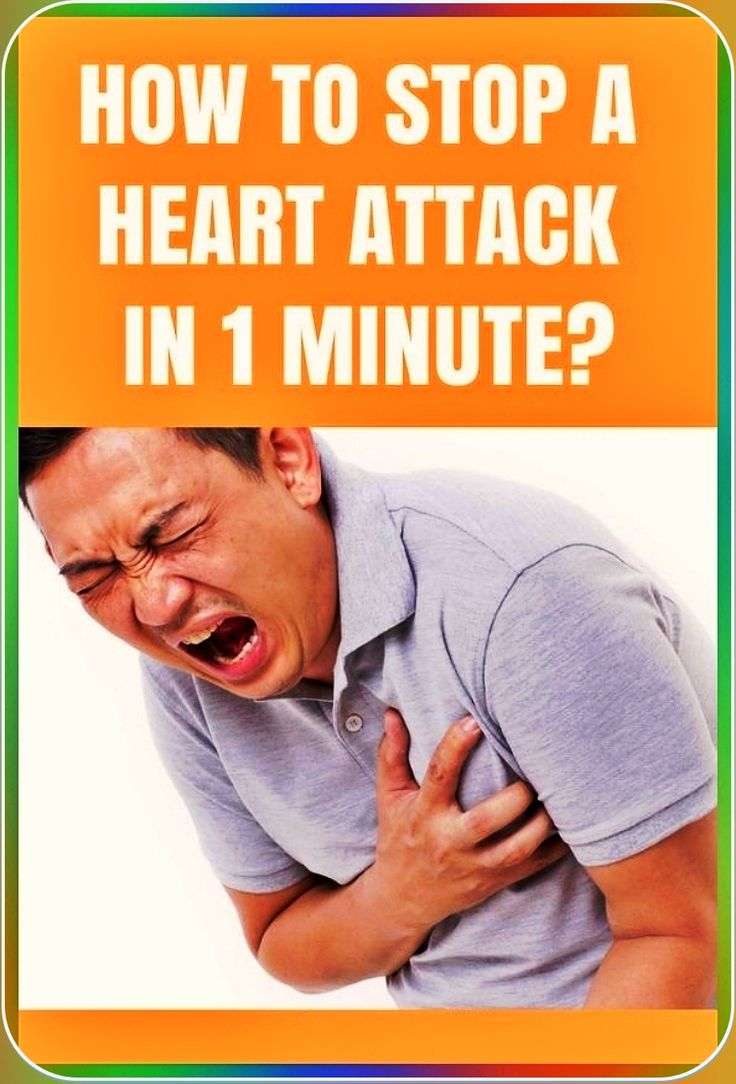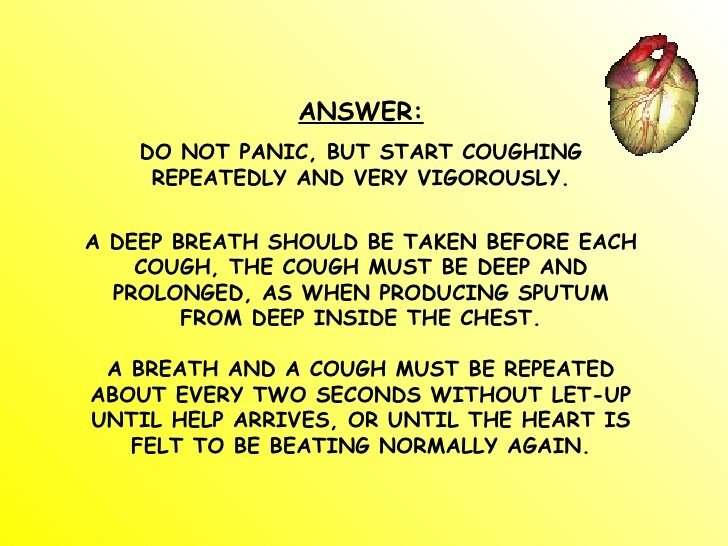Can You Cough Away A Heart Attack
Take-home message:-A variety of internet posts and e-mail chains have said that when you have symptoms of a heart attack, you should cough vigorously to essentially perform CPR on yourself.-This idea makes no sense because CPR should only be performed on an unconscious person with no pulse. If you are conscious and can cough, you should not perform CPR.
A friend of mine recently asked me to debunk something they saw on the Internet. It was a facebook post that advised people who were having a heart attack to start coughing strenuously and repeatedly in order to perform CPR on themselves. This idea, known as cough CPR, is not new and seems to go back to a series of mass e-mails back in 1999.
The post usually goes something like this:
How to survive a heart attack when alone
Cough repeatedly and vigorously. A deep breath should be taken before each cough and the cough must be deep and prolonged as when producing sputum from deep inside the chest. The cough should be repeated every 2 seconds until help arrives. Deep breaths gets oxygen into the lungs and cough squeezes the heart and keeps the blood moving.
There are several problems with this idea and it is worth noting that neither the American Heart Association nor the British Heart Foundation recommend it. The British Heart Foundation goes so far as to say Please avoid spreading this myth any further. In the end, cough CPR though doesnt quite make sense for several reasons.
Know The Symptoms Of A Heart Attack
Knowing the warning signs of a heart attack is crucial. Early treatment within the first few hours of a heart attack can reduce the damage done to the heart and even safe your life.
Chest pain is the main symptom of a heart attack. This sign is more common in men than in women. Women have a higher likelihood than men to have a heart attack without typical chest pain.
Other heart attack symptoms include:
- Shortness of breath
Pain In The Upper Abdomen Heartburn
This can occur with or without pain in the chest area, which will likely resemble heartburn. It usually feels more like discomfort rather than a heart attack symptom.
This pain is typically ignored due to its commonality and association with gastrointestinal disorders. Women are more likely to experience this kind of symptom and should be more aware of it as well.
If you feel youre at risk of heart disease and the pain you feel is unusual, its best to assess yourself for heart attack signs and do first aid immediately or perhaps, grab some healthy fruits or berries if you have some at home.
RELATED:;10 Items to Help You Survive When Youre ALONE in the Wilderness
Don’t Miss: Is Heart Rate The Same As Blood Pressure
Rest In A Comfortable Position And Wait For The Ambulance To Arrive
Resting will relieve pressure on the heart as it tries to pump blood around the body.
This may involve sitting or lying down, depending on which feels more restful.
If someone is on their own when they think they are having a heart attack, they should call 911 right away and follow the advice of the call handler.
Heart Disease Symptoms In Women

Heart disease is the leading cause of death among women, and heart attack symptoms and signs can be different for women than for men, for example:
- Chest tightness
Sometimes people having a heart attack experience no symptoms at all. The medical term for this is silent ischemia, commonly referred to as a “silent” heart attack.
If you think you are experiencing signs of a heart attack, call 911 immediately!
Read Also: Does Acid Reflux Cause Heart Palpitations
When To Contact A Medical Professional
- Does not respond to you
- Is not breathing
Adults should take steps to control heart disease risk factors whenever possible.
- If you smoke, quit. Smoking more than doubles the chance of developing heart disease.
- Keep blood pressure, cholesterol, and diabetes in good control and follow your health care provider’s orders.
- Lose weight if obese or overweight.
- Get regular exercise to improve heart health.
- Eat a heart-healthy diet. Limit saturated fats, red meat, and sugars. Increase your intake of chicken, fish, fresh fruits and vegetables, and whole grains. Your provider can help you tailor a diet specific to your needs.
- Limit the amount of alcohol you drink. One drink a day is associated with reducing the rate of heart attacks, but two or more drinks a day can damage the heart and cause other medical problems.
Heart Attack Symptoms Include More Than Just Chest Pain
Did you know bad indigestion could be a sign youre having a heart attack? Most people know to call 911 if they experience severe chest pain, but chest discomfort isnt always present when a heart attack occurs.;Call 911 if you suddenly experience chest pressure or tightness that radiates to your jaw or either arm, shortness of breath, nausea and vomiting with no explanation, says Duke cardiologist;Christopher Granger, MD.;
That message is particularly important for women, older people, and people with diabetes, says Dr. Granger. It may simply be weakness or nausea or feeling poorly. If you suddenly feel any of those symptoms, seek immediate medical attention.
People who are alone may minimize their symptoms, but its even more important for them to call 911 because it will get you better care faster.
Paramedics can do an EKG, which will tell if there is a blockage or an artery that needs to be fixed, he says. They are very good at diagnosing a heart attack, and can get people to the best hospital as quickly as possible.
Recommended Reading: How Accurate Is The Apple Watch Heart Rate
A Brief Overview Of Heart Attacks
A heart attack occurs when blood flow to the heart is blocked by buildup inside the arteries. If this buildup goes untreated, there is a larger risk of severe damage to the heart muscle or even death. Knowing how to spot a heart attack when it occurs can be key to the recovery process.;
Note that it is crucial to know the difference between cardiac arrest and a heart attack. With a heart attack, there are a few steps you can take to ease the situation while medical help arrives for the victim, but cardiac arrest requires medical attention immediately.;
Dont You Need To Check The Airway First
If you see or hear someone suddenly collapse and they did not show any sign of choking, you dont have to worry about checking the airway. Assume its a sudden cardiac arrest and follow the 3 Cs: Check for responsiveness , Call 911 and Compress at a rate of 100 per minute, about 2 inches deep. If by some chance an object is lodged in the throat, effective compressions likely will dislodge the object, similarly to the way abdominal thrusts dislodges objects.
Don’t Miss: How Do You Calculate Target Heart Rate
The Heart Of The Matter
According to the British Heart Foundation UK statistics, someone is taken to hospital with a heart attack every three minutes.
Many people will be on their own when they have a heart attack. It is vital to know how to help yourself if you are alone and think youre having a heart attack.
More than 30,000 out of hospital cardiac arrests occur in the UK every year.
Angina is discomfort caused by heart muscle complaining due to a reduced blood supply as blood tries to force its way through a narrowed artery.
A heart attack is when the narrowed artery becomes blocked or ruptures and heart muscle begins to die because of the lack of blood supply.
A cardiac arrest occurs when the heart stops being able to function adequately because of a heart attack or some other medical or trauma problem. The person will stop breathing and become unconscious. It necessary to give CPR, use a defibrillator and call an ambulance to give them a chance of recovery.
First Few Hours Of A Heart Attack Are Critical
A heart attack can very quickly become deadly. The patient can have better outcomes of a heart attack if they arrive to the hospital before cardiac arrest. The longer a patient goes without treatment, the greater long-term damage can occur to the heart, causing parts of the heart muscle to die.
Treatment should be administered as soon as possible, along with unblocking arteries in order to prevent long-term damage and complications.
Your odds of survival depend on seeking immediate treatment, so recognizing the signs and symptoms of a heart attack will prompt you to get help right away and prevent complications.
Devon Andre has been involved in the health and dietary supplement industry for a number of years. Devon has written extensively for Bel Marra Health. He has a Bachelor of Forensic Science from the University of Windsor, and went on to complete a Juris Doctor from the University of Pittsburgh. Devon is keenly aware of trends and new developments in the area of health and wellness. He embraces an active lifestyle combining diet, exercise and healthy choices. By working to inform readers of the options available to them, he hopes to improve their health and quality of life.
Recommended Reading: What Is Target Heart Rate
How Is A Heart Attack Diagnosed
The ambulance team will do an electrocardiogram ;to detect whether youâre having a heart attack.;If the ECG shows youre having a heart attack, youre likely to have emergency treatment as soon as you arrive in hospital.;If the ECG doesnt confirm a heart attack you might need further tests to investigate if you are having a heart attack, including:
- an assessment of your symptoms and medical history
- physical examinations, including measuring your blood pressure and monitoring your heart rhythm and heart rate
- blood tests including a troponin test to detect if theres been any damage to your heart muscle
- further ECGs;
- an echocardiogram.
You might hear a heart attack being called acute coronary syndrome, myocardial infarction or coronary thrombosis while youâre at hospital.
Also Check: Is Heart Rate The Same As Blood Pressure
Why Dont You Check For A Pulse

We do NOT recommend that lay public rescuers waste time trying to assess for a palpable pulse. During Dr. Kerns tenure as AHA National ACLS Chairman, the AHA came to the same conclusion. Public lay rescuers cannot reliably detect the absence of a pulse in a timely fashion, hence in the 2000 and 2005 AHA CPR Guidelines : IV-3), this requirement was removed.
Studies have also shown that even if a person manages to locate the correct spot for detecting a pulse, there is a high chance that the pulse they may detect is their own, especially considering heightened stress levels in such situations. Rather than wasting time trying to detect a pulse that may or may not be the victim’s own pulse, it is better to get perfusion to the brain by continuous chest compressions.
The correct response to a witnessed cardiac arrest is to:
- Check for responsiveness .
- IF NO RESPONSE, call for help or ask someone else to call.
- Begin uninterrupted forceful continuous chest compressions immediately.
Recommended Reading: Why Does Your Heart Rate Go Up When You Exercise
How Long Does A Heart Attack Last
Initial heart attack symptoms, including chest pain and shortness of breath, may come and go. Symptoms often last around 10 minutes or longer.
A study published in Critical Pathways in Cardiology found that symptoms lasting less than five minutes are unlikely to indicate a heart attack, while symptoms lasting longer than five minutes should be taken seriously as signs of a myocardial infarction .
However, this finding comes from only one study. So if you have symptoms lasting longer than a few minutes, you need to call 911.
Does Cough Cpr Work
Q.A friend of mine shared a Facebook post about how to survive a heart attack when you’re alone. It says that you should cough very forcefully every few seconds until help arrives. Can that actually help?
A. This “advice” has been circulating around the Internet for nearly 20 years. I was reluctant to even address this question out of concern for perpetuating the idea of “cough CPR” or causing undue worry. However, I think it’s important to clear up the confusion around this topic.
To continue reading this article, you must log in.
- Research health conditions
- Prepare for a doctor’s visit or test
- Find the best treatments and procedures for you
- Explore options for better nutrition and exercise
Read Also: Can Ibs Cause Heart Palpitations
What To Do If You Or Someone Else May Be Having A Heart Attack
- Don’t ignore or attempt to tough out the symptoms of a heart attack for more than five minutes. If you don’t have access to emergency medical services, have a neighbor or a friend drive you to the nearest hospital. Drive yourself only as a last resort, and realize that it places you and others at risk when you drive under these circumstances.
- Chew and swallow an aspirin, unless you are allergic to aspirin or have been told by your doctor never to take aspirin. But seek emergency help first, such as calling 911.
- Take nitroglycerin, if prescribed. If you think you’re having a heart attack and your doctor has previously prescribed nitroglycerin for you, take it as directed. Do not take anyone else’s nitroglycerin, because that could put you in more danger.
- Begin CPR if the person is unconscious. If you’re with a person who might be having a heart attack and he or she is unconscious, tell the 911 dispatcher or another emergency medical specialist. You may be advised to begin cardiopulmonary resuscitation . If you haven’t received CPR training, doctors recommend skipping mouth-to-mouth rescue breathing and performing only chest compressions . The dispatcher can instruct you in the proper procedures until help arrives.
- If an automated external defibrillator is available and the person is unconscious, begin CPR while the device is retrieved and set up. Attach the device and follow instructions that will be provided by the AED after it has evaluated the person’s condition.
Why It Doesnt Work
Some rhythms could lead to cardiac arrest, and I think thats why people thought, Oh, if the cough will prevent the cardiac rhythm maybe it will help the cardiac arrest, Sorrentino said. But most patients that go into cardiac arrest are going to go into a more chaotic rhythm.
Chaotic rhythms are what prove the method false. Simply coughing will not always correct an irregular chaotic rhythm, and it cannot prevent the patient from going into cardiac arrest.
So what should you do if youre having a cardiac event or youre with someone else who is? The best initial response is to call 911. If you or someone else is properly trained, start CPR and, if available, use an automatic external defibrillator .
Also Check: What Is A Good Resting Heart Rate By Age
Chest Discomfort Or Pain
Experiencing chest pain is a classic sign of a heart attack.;The feeling can come and go, last for a few minutes, or stay and intensify for even longer.
Once you recognize this feeling, stop whatever youre doing and proceed to a safe place. Try to relax to slow down your heart rate.
This will prevent further damage to the heart.
Preventing A Heart Attack
There are 5 main steps you can take to reduce your risk of having a heart attack :
- smokers should quit smoking
- lose weight if you’re overweight or obese
- do regular exercise adults should do at least 150 minutes of;moderate-intensity aerobic activity each week, unless advised otherwise by the doctor in charge of your care
- eat a low-fat, high-fibre diet, including wholegrains and at least 5 portions of fruit and vegetables a day
- moderate your alcohol consumption
You May Like: Why Does Heart Rate Increase During Running
Can I Be Held Liable For Performing Chest
The Good Samaritan law protects bystanders and their actions when they decide to help someone in an emergency. There is some form of the Good Samaritan Law in all states of the U.S. Chest-Compression-Only CPR and conventional CPR are both covered under the Good Samaritan Law. It does not matter whether you are certified or not but remember to always respect the patient.
Symptoms Of A Heart Attack

Symptoms of;a heart attack;can include:
- chest pain;;the chest can feel like it’s being pressed or squeezed by a heavy object, and pain can radiate from the chest to the jaw, neck, arms and back
- feeling weak or lightheaded, or both
- an overwhelming feeling of anxiety
It’s important to know that not everyone experiences severe chest pain. This is particularly the case with many women. The pain can often be mild and mistaken for indigestion.
It’s the combination of symptoms that’s important in determining whether a person is having a heart attack and not the severity of chest pain.
You May Like: How Does Exercise Affect Heart Rate
Where Did The Idea Of Cough Cpr Come From
According to Sorrentino, the idea was initially supported by anecdotes and case reports.
We would occasionally see that in the intensive care unit or in a cardiac catheterization lab someone would go into a ventricular arrhythmia or supraventricular arrhythmia , Sorrentino said. And when we tell the patient to cough really hard that could terminate the rhythm.
In this instance, it seems like the method works successfully. But Sorrentino notes that most heart rhythms are more complex than a single cough can handle.
